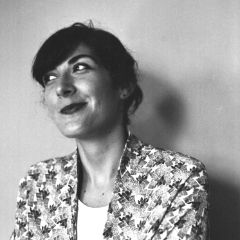There are some pieces one never tires of hearing. Barrie Kosky's staging of Fiddler on the Roof (or "Anatevka", as it's known in German) is one of them. First performed in Berlin in 2017, the production was revived with great success in Strasbourg in December 2019. Kosky is celebrating his tenth and final season at the helm of Komische Oper Berlin: he and the Komische team are giving themselves a small treat by reviving this masterpiece by Joseph Stein, Jerry Bock and Sheldon Harnick, one of the most popular musicals of the second half of the twentieth century – second only, perhaps, to West Side Story.
The Berlin audience is up for it. A near-full house waits impatiently to immerse itself in the world of pre-1917 Russia, the shtetl (Jewish village) of Anatevka and the family of the milkman Tevye. It is a pleasure to return to the sparse sets, the background of a frozen landscape and an imposing double door: the calm before the storm. We hear the musicians arrive in the pit, the clarinet makes a first clamour even before the first oboe gives the A, as if to show that, this evening, it will be the one leading the dance.
The well-oiled staging shows no sign of aging. In the shtetl of Anatevka as conceived by Kosky, the fiddler on the roof is a young teenager in sneakers and a green hoodie, arriving on stage on a scooter, headphones wrapped around his ears. Contrasting with the monochrome background, he makes the link between the audience and the inhabitants of the village. Ditching the headphones and the scooter, he flings open the doors at centre stage to reveal a giant closet where he will find his famous violin. The first notes of the theme fill the house: the evening can begin.
"Tradition!" As the first tableau takes shape, with the villagers emerging one by one from the wardrobe, Tevye explains the title of the work: every Jew is like the fiddler on the roof, seeking to play a virtuoso tune while finding his balance in a world in which he lives with the traditions inherited from his religion. In the pit, the percussion and brass joyfully give it their all; on stage, the chorus pervade the space and give voice to the villagers of Anatevka and their cherished traditions. In the audience, we appreciate the comfort of the Komische Oper, which goes so far as to offer each of us subtitles in our choice of language, thanks to a small screen in the seatback in front.
Rufus Didwiszus's sets remain just as minimalist for the rest of the evening. It's the wardrobes and cupboards, piled one on top of the other to form a large wall, which delimit the villagers' living space. Through these numerous double doors, we see most of the characters' entrances and exits as well as many funny situations: even Tevye and his wife Golde's marital bed is nestled in a large overturned wardrobe.
Jerry Bock's music is full of contrasts and is perfectly mastered by the musicians of the Komische Oper Orchestra, under the baton of Koen Schoots. The transitions between the scenes of joy and collective celebration and, on the contrary, the moments of conflict, despair and sorrow are admirably rendered by the orchestra and the soloists. The performances of Max Hopp in the lead role and of the young tenor Johannes Dunz as the tailor Motel Kamzoil are particularly well received.
Act 2 takes place outdoors with an even sparser setting. The wall of wardrobes has been replaced by a carpet of snow and the only objects present are those that the families of Anatevka will leave behind when they leave their homes. The festive atmosphere of Act 1 gives way to the pain of separation and the sadness of departure. The evening does not end with a traditional Broadway-style happy ending – quite the opposite. And that is what gives this play an extra dimension.
Never falling into the extremes of pathos or mindless entertainment, this production of Fiddler on the Roof raises questions that are as relevant in the 21st century as they were in the century before. Leaving the theatre with a heavy heart but eyes full of beautiful images, one cannot fail to hum Anatevka's heady tunes.
Translated from French by David Karlin




